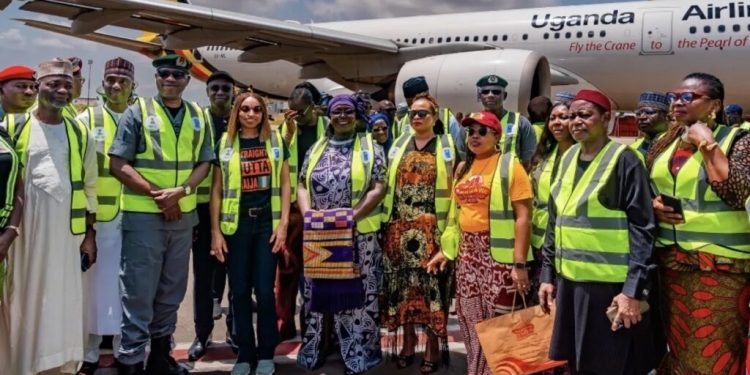In a bold move to strengthen regional trade and fully activate the African Continental Free Trade Area (AfCFTA), the Nigerian government has inaugurated a dedicated air cargo route linking Nigeria to East and Southern Africa. The initiative, flagged off at Abuja’s Nnamdi Azikiwe International Airport, is expected to significantly ease the movement of Nigerian exports to key African markets including Kenya, Uganda, and South Africa.
Designed to support micro, small, and medium enterprises (MSMEs), the new corridor offers a direct and affordable trade pathway, particularly for businesses under recognized umbrella associations such as NACCIMA, NASME, NASSI, and WCCIMA. The Minister of Industry, Trade and Investment described it as a strategic African-led solution aimed at enabling Nigerian entrepreneurs to compete effectively across the continent.
“This is more than just a logistics service; it’s a trade enabler by Africans for Africans,” she said, noting that the platform offers MSMEs reliable access to regional markets at significantly reduced costs. Air cargo rates along this corridor are reportedly 50 percent cheaper than prevailing commercial rates and are exclusively available to businesses verified through recognized associations, a model that ensures transparency and proper trade tracking.
Developed in partnership with Uganda Airlines and backed by the United Nations Development Programme (UNDP), the route addresses long-standing trade challenges such as high transport costs, delays, and limited connectivity. It will especially benefit exporters of perishable and time-sensitive goods like textiles, processed foods, cosmetics, and leather products. What used to take weeks to deliver across borders can now be done within days.
The project aligns with Nigeria’s recent gazetting of its Provisional Schedule of Tariff Concessions (PSTCs), a key step towards implementing AfCFTA protocols. This development allows Nigerian exports to enjoy tariff reductions across other African member countries, thereby enhancing the competitiveness of local products on the continent.
In addition to the cargo route, the federal government is also preparing to launch an AfCFTA Market Intelligence Tool to guide Nigerian businesses in understanding trade regulations and market opportunities across Africa. This tool, being developed in collaboration with UNDP, is aimed at empowering exporters with up-to-date market data and helping them navigate the complexities of cross-border trade.
The event was attended by prominent figures in Nigeria’s trade and aviation sectors, as well as representatives from international and regional institutions. Officials from the Nigeria Customs Service, Federal Airports Authority of Nigeria, and Uganda Airlines were present, signaling strong institutional backing for the corridor.
Expressing appreciation to both public and private sector partners, the Minister called on Nigerian entrepreneurs to seize this new opportunity. She emphasized that the infrastructure, policy support, and international partnerships are now in place to help Nigerian goods reach the wider African market with full federal support.
Analysts have welcomed the initiative as a timely step to unlock intra-African trade potential and reposition Nigeria as a continental trade leader. With intra-African trade still accounting for less than 15 percent of the continent’s total trade volume—far behind other regions like Europe and Asia—this air corridor is seen as a practical solution to bridge the gap.
Beyond enhancing trade flows, the corridor is also expected to stimulate value-added production, create jobs, and reduce Nigeria’s dependency on non-African export destinations. It sets a precedent that could inspire similar corridors in other regions of the continent, contributing to AfCFTA’s vision of a connected, self-reliant African economy.










